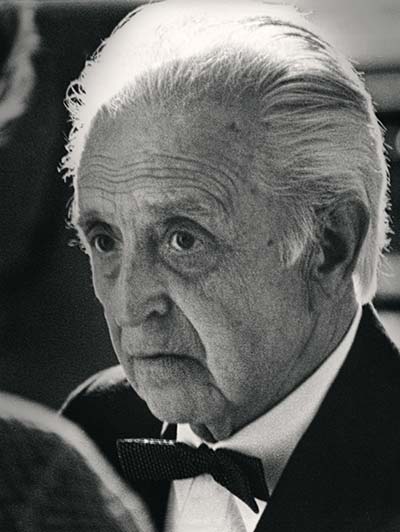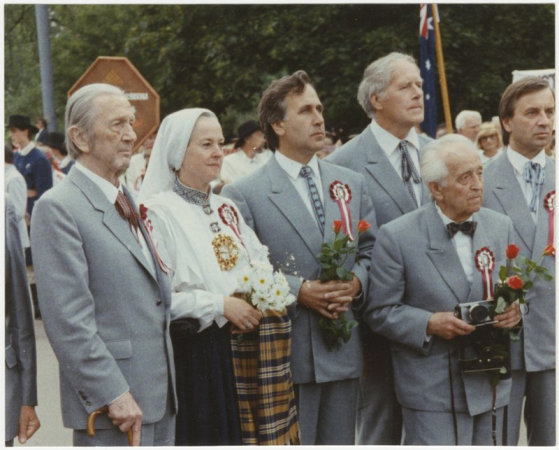Haralds Mednis
1906–2000
Conductor, educator, organist
Born on 16 August 1906 at the Opekalns homestead in Jaunlaicene Parish. Studied at Lazdona congregational school and Rīga’s City secondary school No 1 (1920-1924).
Acquired his basic musical knowledge under the direction of his father, later - Arvīds Daugulis. Studied mathematics and astronomy at the Department of Mathematics, Faculty of Natural Sciences, University of Latvia for a short period (1924-1925). Studied music at Vīgneru Ernests’ Institute of Phonology, but at the age of 32 enrolled in the Conservatory of Latvia, where he undertook in-depth studies in composition, conducting and organ music (1938-1949).
Took his first steps as a conductor at the age of 19 when, after his father’s death, he moved to the Madona District and took over his father’s Lazdona congregation choir (1925-1940). Over time, he also conducted the Madona Civic Guard regimental male choir, Madona High School boys’ choir, and the Latvian Scout choir.
Became a chief conductor at the age of 25 when entrusted with the massed choir at the Mārciena Days of Song, but his first success in the song-festival context dates back to 1938, when his Lazdona Parish choir took 1st place in the rural choir group at the IXth Song Festival choir competition . Since that time, Mednis has been a guest, conductor and chief conductor at countless district song festivals.
Lived and worked in Rīga from 1938, directing the Klaustiņš choir (1939-1940), Latvian Labour chamber choir (1939-1940), Central Trade Union Council choir (1940-1942), the Dziedonis (Minstrel) male choir (1940-1950). He was also choirmaster of the Latvian National Opera (1941-1969) and organist at Martin’s Church in Rīga (1938-1944).
In 1947, he founded the notable Rīga Teachers’ choir, later renamed Skaņupe (River of Sound), conducted the mixed choir of the State University of Latvia (now Juventus, 1950-1957) and the Latvian State University male choir (1950-1957), but at the end of his life the legendary Tēvzeme (Fatherland) male choir.
Working with a choir was the singular love of Mednis’ life. Raimonds Baltakmens, president of the Tēvzeme choir remembers: “Haralds Mednis was mannishly reserved, introverted, only fully revealing his ego in moments of catharsis, before the choir, when he unveiled the interpretation of his compositions to listeners unconditionally, first of all captivating the singers and then the whole audience. This emotional artist was gladdened by the almost always present, huge appreciation of audiences, and we sometimes had to reprise songs until we were exhausted. ... He repeated songs in concerts, but never repeated himself! I think he enjoyed surprising audiences with different interpretations of songs.” (Grauzdiņa, Ilma, Izredzētie (The Chosen Few), 2008, p 113)
The outstanding musician was honoured with the title of chief conductor for almost half a century – from the XIth to the XXth All-Latvian Song and Dance Festivals, and granted the title of Honorary chief conductor at the XXIst and XXIInd Song Festivals.
Gaismas pils (Castle of Light) by Jāzeps Vītols was Harald Mednis’ career-defining song – performing it with the Lazdona choir in 1938, he won the laurels in the choir competition. This is followed by three important moments in Song-festival history involving this composition. The first, in the presence of the composer’s widow Annija Vītola, the enthusiastic choir performed Gaismas pils three times under the direction of Mednis, the second – at the culmination – Song Celebration – of the 1985 Song Festival, when Mednis had been removed as a chief conductor, the massed choir called him out from the audience to conduct Gaismas pils, the third – at the 1998 Song Celebration. This time he is seated among the Honorary chief conductors, but has not been allocated a song. But once again, the massed choir calls out for the 92-year-old conductor and he climbs the podium to conduct his career-defining song for the last time.
He was an outstanding educator, working in the Conservatory of Latvia’s Department of Choir Conducting. Many upcoming Song-festival conductors, Terēze Broka, Pauls Kvelde, Romāns Vanags and others acquired their knowledge under his guidance.
Medal of Honour, First Class, Order of the Three Stars (1935), Bearer, Cross of Recognition (1938), Latvian SSR Order of Honour for artistic endeavours (1956), People’s Artist of the Latvian SSR (1977), Winner of the Jānis Cimze Prize (1990), Officer, Order of the Three Stars (1994), winner of the Grand Music Prize 1998, honorary member of the Rīga Latvian Society (1994), honorary Professor of the Jāzeps Vītols Latvian Academy of Music (1995) and honorary member of the Latvian Academy of Sciences (1995).






























































